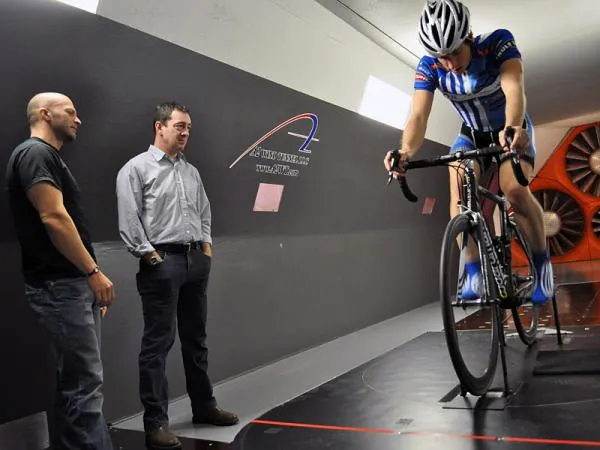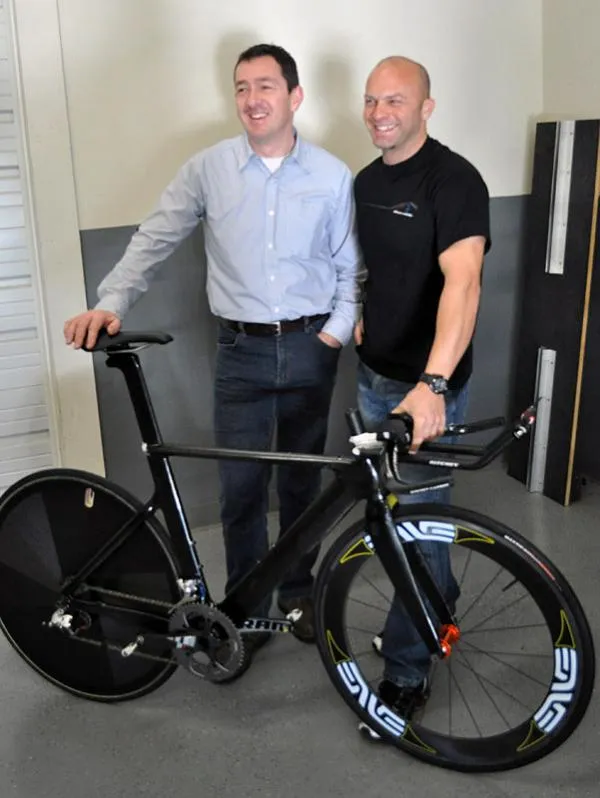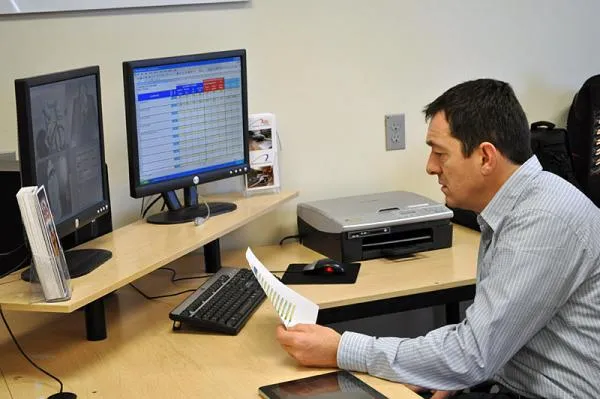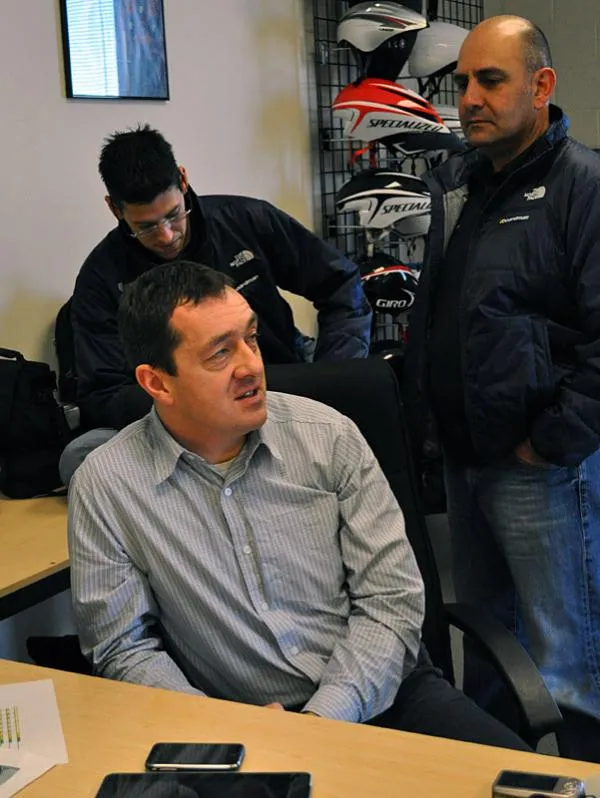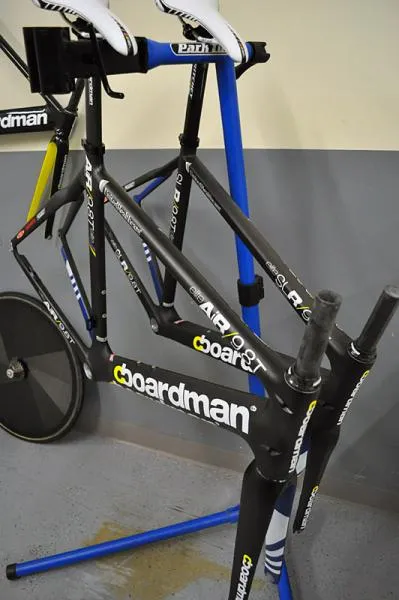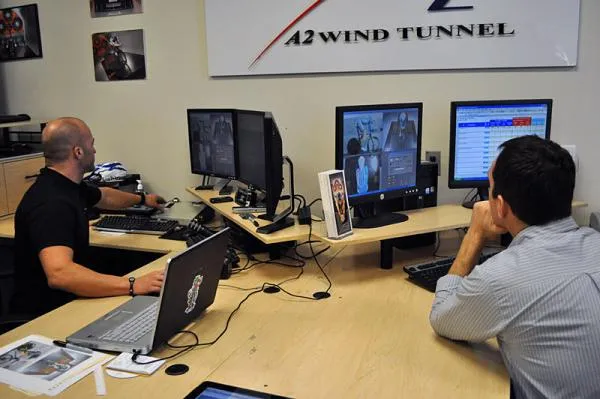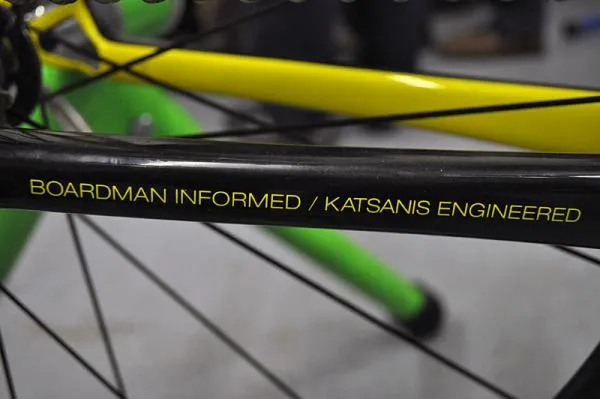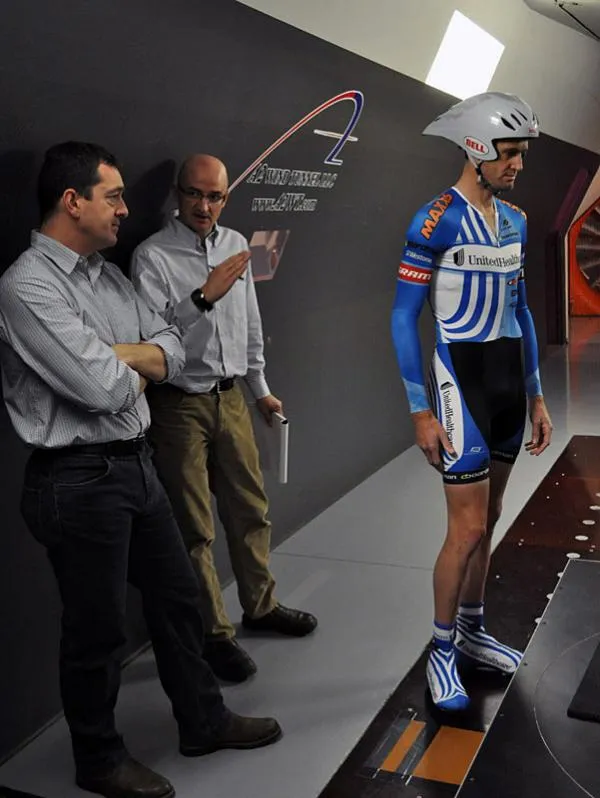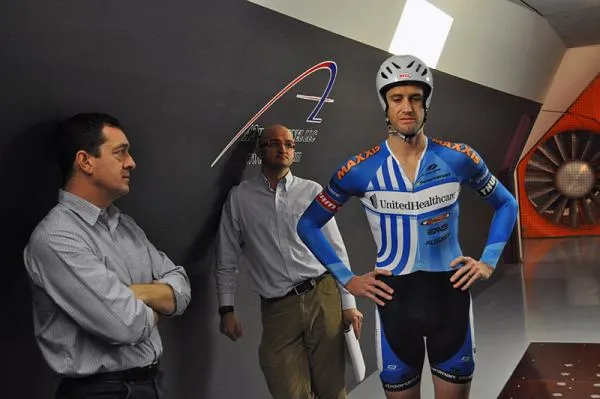Boardman Bikes are making a big push into the USA this year with sponsorship of the UnitedHealthcare Pro Cycling team and a new range of higher-end bikes. Our sister website Cyclingnews caught up with Chris Boardman at a North Carolina wind tunnel earlier this month to discuss sponsorship, UCI regulations and the individual pursuit.
CN: How did you get involved with UnitedHealthcare as their bicycle sponsors?
Chris Boardman: We've been thinking about pro teams for a while now. Our business model has really established ourselves at the lower end – up to the £1,500 bike. It's gone incredibly well in the UK, and the challenge is literally making the bikes fast enough [to meet customer demand]... [But] the bit we were really interested in was the racing bit.
Myself and my director of operations, Andy Smallwood, we both have a racing background and had lots of ideas, sketches and things that we wanted to do but we needed to put them out there properly. You have to have a market, or else you're just throwing money away. In the pro team scene, the ProTour [now WorldTour] teams were just too big for us, too big a step, so we wanted to get involved with somebody who'd grow with us.
It's been about a year where we've been looking around, waiting for an opportunity to come along. This one actually came along really late when the co-founder of the [Boardman] business, Alan Ingarfield, spoke to Thierry [Attias, UnitedHealthcare team president] and it just seemed to fit really well. We talked and they seemed like the right level for us. Their ambition is to grow as a Pro Continental... [and this] made them the right people to grow with at the same rate.
Also, we wanted someone who was going to help us develop the product. Being a pro, I've worked with a lot of manufacturers who would say, 'Yeah, we work with pro teams, would you help us with our product?' And they would say, 'What do you think of this wheel?' and I would think, 'It's already finished, you've already done it'. So what they really wanted me to do was say, 'It's great!'.
That's not the case here [with UnitedHealthcare]. These guys are going to take a first-out-of-the-mould working prototype and then they're going to test it properly. And if it's good enough to race, they're going to race it and tweak it. They'll then provide feedback and we'll still have time to feed those changes into the model.
So they're genuinely involved in the product development. And here [at the wind tunnel] we see they've got some really big guys on this team. So we're looking at it and thinking about the changes we're going to make for them. They just seem like a nice, fit group of people. And I guess we fit with them as well.
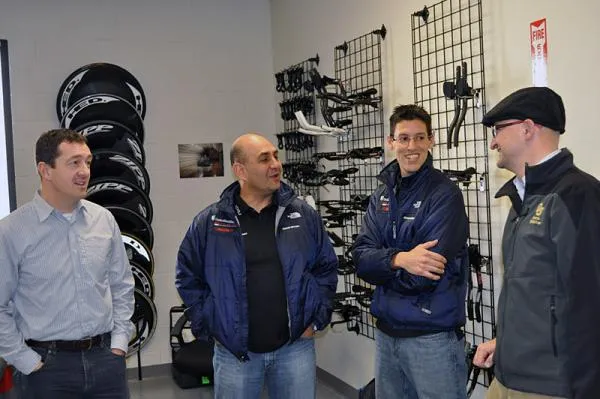
Chris Boardman, UnitedHealthcare's Thierry Attias and Mike Tamayo, and Iñigo San Millán (l-r) at the A2 Wind Tunnel
What's the length of commitment for Boardman Bikes?
It's a multi-year agreement going forward, so that each year it financially changes as they get bigger, which is fair enough. I enjoy Mike [Tamayo, team manager] and Thierry – their pragmatic and honest approach is great. We haven't had to do this marketing-speak, it's all been practical, real stuff. We're able to have proper conversations and a proper relationship.
What's the availability of Boardman bikes in the United States?
The brand's got so big in the UK that it's a waste just doing it in the UK. We knew we wanted to grow internationally, but we wanted to make sure we get out there in the right way. It's been pretty much done this week. In a few weeks' time you'll be able to place pre-orders.
The whole range is going international. We knew we wanted a vehicle to do that, so it all just ties together and this should be a big year for us. We believe in the product and now we have to see if the rest of the world does. Half of that is being able to get the product visible so people can see it and make the choice.
How active a role will you take with advising the team? You're here offering your services as an aerodynamics consultant; how frequent an occurrence will this be?
It's a limited role. That's one of the honest conversations that we've been having. These guys will have me come in and I'll just listen. I don't want to promise anything I can't deliver, so let's take it a step at a time. I'll go and see them at some races, and if I can, add value. I don't want to make noise and get in the way. So if I can add some value... I'm enjoying it [here], frankly.
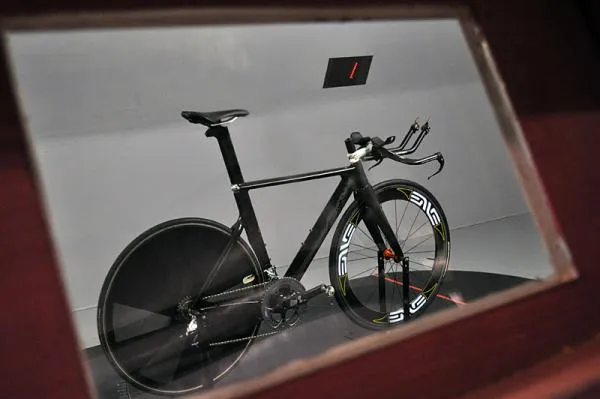
A prototype Boardman time trial bike set up in the wind tunnel
Gaining entry to European races is easier if you have a relationship with the organisers. While UnitedHealthcare may be an unknown entity, Chris Boardman isn't. Have you played a role in that aspect of the team?
If I can help, if it would make sense to do so, then I'll do it. I want to see our bikes used in Europe as well. This isn't something we did just because it's a US team, we did it because this team's going to be all over the world. If they have an ambition to be genuinely Pro Continental, then the fit will be a good one. So I'll help in any way to get them into races.
How influential I can be, well, that remains to be seen [laughs]. But ultimately it comes down to them. They're already in [the Malaysian Tour de] Langkawi, in a race where they're very visible. If the guys can do a credible job then the invites will come. Ultimately, it comes down to their performances.
How visible will you be at races?
I'd like to attend races as much as I can, frankly. I'll try to tie in other experiences, other things that I have to do around the calendar, and make it happen. It would be good to get back on the front line. I work for the BBC covering track cycling and ITV for the Tour de France, so that's as close as I'm getting at the moment.
The Sky team, I had an opportunity to get heavily involved in that, but the volume of work [meant] I'd have had to cut away other things and it was just too intense for me. I like the guys, but it was too much. This is going to be the right level, I think.
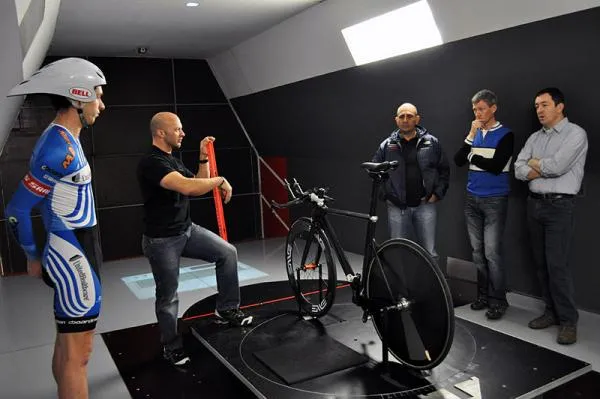
Discussion in progress concerning UnitedHealthcare rider Scott Zwizanski's time trial position
Your Twitter feed mentioned "Wonder if the frame I came across Atlantic to test made connection!?" Is that the prototype that Scott Zwizanski rode this morning in the wind tunnel? What model is that?
That's the base of our time trial frames, and the first iteration will be out in about two months. First we do computational fluid dynamics – that comes up with the shapes of things we want to use. Then we have to make it and test it. If that's good, off we go with the first mould.
Then, if we build it as a real bike – which is the case of the frame here, and you'll see on that bike some pieces of plasticine for shaping – we can still make those changes. There are 10 changes that have been made to that frame already. Those changes are in place, so we're pretty much ready to push it out. The final phase of the testing will be these guys coming back and giving us some feedback.
I don't think it's an exaggeration to say that nobody has spent more time in wind tunnels than me, and I don't know if that's a good thing or a bad thing. They're sexy places for about 10 or 15 minutes and then it's deathly boring. This here [at A2 Wind Tunnel] isn't the way I normally use wind tunnels where it's all pre-planned. Here, it's much more dynamic, but it's about rider position which is a dynamic thing. Anything to do with the equipment is additional to that.
It's a great facility, a really great facility, and they can turn around tests so fasts you can get through so many. And Mike [Giraud] here is very experienced. I was listening to the advice he was giving and I chose to step back because he was saying all the things that I've validated.
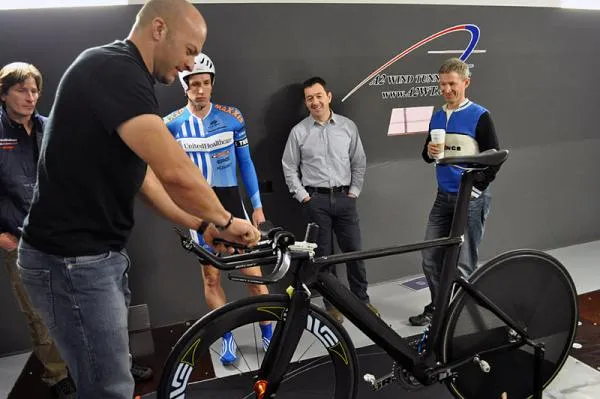
A2 Wind Tunnel's Mike Giraud makes an adjustment to Scott Zwizanski's prototype time trial bike
In your career as a professional, particularly with your record-breaking individual pursuit and hour record performances, how much time did you spend in a wind tunnel?
None. I didn't do any. I did some with Lotus in 1992, but for my career what we did was use power cranks and set them at a really high resolution and capture rate, every second, and we used the track as a nice controlled environment. We could control the temperature, record the air pressure, humidity, all those things and did a lot of repeat trials.
Peter Keen [Chris's former coach, who's now director of performance at UK Sport] and I used that as our wind tunnel because it was very repeatable. We got some really accurate data. We used it more for a selection process for equipment and positions. We didn't use it as a scientific tool; to do that would just have been too tiring. To make it real you'd have to do it at 50 km/h for reasonable lengths of data capture as well.
As someone who pushed the design envelope as a professional regarding equipment, and now as someone who has his own bicycle company supplying equipment to a professional cycling team, can you comment on the UCI regulations and restrictions on bicycles?
I'm really happy to have the platform to say something, honestly, because there have been massive misconceptions about my stance. I think the UCI assumed that I was trying to pull a fast one all of the time. Looking back, I really didn't want to use the superman position. I thought it was just stupid, it's human-powered vehicle racing and I didn't want to do it.
At the test that we did for the 1996 hour record we tested all different positions and equipment and right at the end I had an engineer build a set of bars to test. And we said, 'Should we test it?' Well, if we professed to be open-minded we at least had to give it a look. So I did a few laps and I thought, 'Oh crap, it actually works!' So we had to do it, because the rules said that we could. The point is that I didn't want to do that, but the rules allowed it.
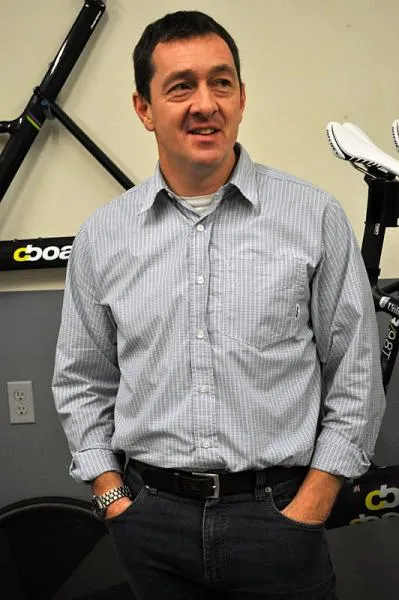
Chris Boardman says the UCI are heading in the right direction with their regulations but would be well advised to consult more widely before bringing in new rules
What the UCI are trying to do now, I'm fully supportive of. I think it's the right thing to do, instead of having a big grey area where a commissaire just says 'That's right... that's wrong'. Those poor guys are on the line trying to make a decision, in an incredibly intense position. They [the UCI] are trying to make more of a line than a grey area.
I'd like to have seen a consultation period. In politics in Britain, somebody conducts a study and produces a white paper. That goes out, people get to look at it and go, 'Ah, you haven't thought about this'. That would allow the people who have to draft legislation to go, 'Good point'. Whereas here, we seem to have jumped from 'we need to do this' to 'here are the rules, they're effective in a few weeks, here's the protocol'.
I feel sorry for them, really, because there are lots of holes in it and people would have helped them with the holes if they'd asked to start with. I don't want to be one of those people who shoots at the UCI, I want to be supportive of what they do, so it would be good if they introduced that consultation process, genuine consultation. Then they'd make something that sticks, that's long-lasting and well-supported. I definitely support the philosophy of what they're trying to do.
We have a phenomenally talented generation of young individual pursuiters – Taylor Phinney, Jack Bobridge, Jesse Sergent, for instance – who may very well possess the ability to break your 4,000m world record. But with the event removed from the Olympic Games, they may turn their back on the track and focus solely on the road. What's your opinion about the elimination of the premier track events, the pursuit and Madison, from the Olympics?
I don't spend any time looking backwards. I have an opinion and I think it's disappointing. It's [all about] building a brand, really – the brand of the individual pursuit or track racing. People get familiar with it, comfortable with it, they understand it and they build a following. I think you tinker with a brand at your peril. Some of those things have a huge amount of history and you should think long and hard before you just throw them out.
The individual pursuit is such a pure thing and became one of the blue ribbon events in the sport and to just say we're not going to do that anymore at the Olympics, I just can't agree. I do like the fact that they've got parity between men and women. I still don't understand why the women can't do 4km [pursuits], why they do 500m [time trials] but can't do a kilometre [time trial]; I don't get that. The event selection is an emotive thing, but I definitely wouldn't have thrown the history away so quickly.
